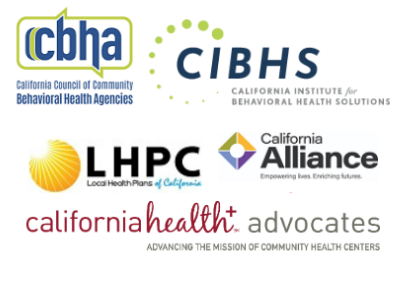

State Roundtable Joint Statement on AB 32

December 15, 2022
The Honorable Gavin Newsom
Governor of California
1303 10th Street, Suite 1173
Sacramento, CA 95814
Assemblymember Cecilia Aguiar-Curry
State Capitol
P.O. Box 942849
Sacramento, CA 94249-004
Assemblymember Robert Rivas
State Capitol
P.O. Box 942849
Sacramento, CA 94249-0030
RE: State primary care and behavioral health organizations applaud passage of AB 32
Dear Governor Newsom, Assemblymember Aguiar-Curry, and Assemblymember Rivas:
The listed organizations are a part of the State Policy and Partnership Roundtable within Delta Center California, a collective that seeks to advance behavioral health and primary care integration policy and practice in the state.
As the associations representing primary care and behavioral health providers and payers in Medi-Cal, we have identified telehealth and tele-audio as priorities for supporting access and quality of care for the Medi-Cal members we serve.
We are heartened by the advancements and momentum surrounding telehealth policy with an eye toward access, equity, and appropriate flexibility in implementation in California.
Specifically, we would like to applaud the passage of AB 32 (Aguiar-Curry, Rivas) Telehealth. Notably, AB 32 permits a health care provider, a federally qualified health center (FQHC) or a rural health clinic (RHC) to establish a new patient using an audio-only synchronous modality (for example, a phone call) when the visit is related to sensitive services (including services related to mental or behavioral health, sexual and reproductive health, sexually transmitted infections, substance use disorder, gender affirming care, and intimate partner violence). AB 32 also permits for a new patient relationship to be established via an audio-only synchronous interaction if a patient requests it or if the patient doesn’t have access to video services.
These steps preserve access to services for Californians without broadband access or devices required to receive services via video. It also acts in the interests of Californians who face barriers to seeing a provider in-person, whether due to a limited number of providers in their area, transportation, or physical mobility issues, among other challenges. Furthermore, these are critical actions to support equity in telehealth implementation.
Research from the Public Policy Institute of California demonstrates that, in 2020, Californians with low incomes were less likely to have broadband access and device(s) at home compared to those with higher incomes. Also in 2020, the state demonstrated inequities in broadband by race and ethnicity, with 80% of Latino households and 83% of Black households having broadband access compared to 87% of white households.*
As the state’s residents and health care workforce continue to weather the COVID-19 pandemic and other threats to health, ensuring equitable access to telehealth services is one way to support the wellbeing of Californians. We commend Assemblymembers Aguiar-Curry and Rivas for their leadership and thank Governor Newsom for taking action to maintain access to telehealth services for Medi-Cal enrollees in our state.
Respectfully,
CaliforniaHealth+ Advocates
California Council of Community Behavioral Health Agencies (CBHA)
California Alliance of Child and Family Services
California Institute for Behavioral Health Solutions (CIBHS)
Local Health Plans of California (LHPC)